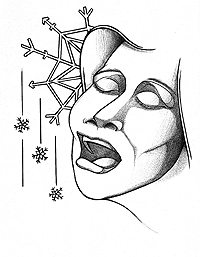Berklee Today
Winter Health Tips for Vocalists
 |
|
| Illustration by John Zebley | |
The winter season is a busy time of the year for a lot of people. Along with changes in weather comes an increased potential for colds and upper respira-tory ailments that can adversely affect the musical activities of singers. Health problems persist at this time of year due to a number of factors. Heating systems dry out the air we breathe. When the throat and nasal cavity are dry they are more prone to retain germs that cause colds. Add in the fact that many of us are not getting enough sleep and have unhealthy diets, and the result can be weakened resistance. What follows are some basic ideas to help you maintain your vocal health.
Get plenty of rest
Everyone has different needs for sleep. Know how much sleep you need to function best, and maintain a regular sleep schedule as much as you can. Rest your voice whenever possible. Schedule time to unwind during your day. This will help you have renewed energy when you need to sing. Don't wait until you burn out before you schedule downtime away from stressful activities.
Drink water
If you stay well hydrated, your body is better able to flush out the germs that cause colds. Make sure to drink six to eight 8-ounce glasses of water per day. Drinking plenty of water can help your voice function better because your vocal cords must be well lubricated to vibrate with the least amount of friction. The water you drink does not go immediately to your vocal cords. Although you feel the immediate relief of water in your throat, it goes to your stomach and passes through your entire system before hydrating the vocal cords. This takes time, so be sure to drink water before you feel thirsty.
Stay physically fit
Your body is your instrument. Whatever you do to improve the health of your body and mind eventually shows up in your voice as increased vitality and energy. Singing is physically demanding, and maintaining good health is essential to career success. Exercising can help you to stay physically and mentally alert and have more energy.
Do not smoke
Anyone who is serious about having a singing career should not smoke. Smoking has long been known to cause emphysema and cancer of the mouth and vocal tract. It irritates vocal tract membranes and the vocal cords. When these membranes are dry and irritated from the chemicals in smoke, your body tries to compensate with secretions. These make you need to clear your throat, which causes further irritation.
Smoking can also aggravate reflux, a condition that occurs when the contents of your stomach migrate back into the esophagus and throat, causing inflammation. Singers sensitive to reflux react to a number of foods and drinks that can impact their vocal condition and singing by causing reflux laryngitis. Singers are particularly prone to reflux due to the high abdominal pressure that is used for breath support.
Don't sing if it hurts
 |
|
| Anne Peckham, an associate professor in the Voice Department, is an active member of the National Association of Teachers of Singing and authored The Contemporary Singer, which is published by Berklee Press. | |
| Photo by Linda Holt | |
As simple as this advice sounds, many singers get caught up in the moment and don't listen to their bodies when they feel discomfort. When you are tired you should rest your voice. If you have what seems to be more than a simple cold or slight pain in your larynx, see a qualified laryngologist who works with singers.
Sometimes, when singers suspect a health problem beyond a cold, they delay going to a doctor because they don't want to receive confirmation that they have a serious vocal problem. Don't delay! Go to a laryngologist who can diagnose the problem and offer advice regarding upcoming singing engagements.
Singing over a cold
There are times when you can sing with a cold and times when you absolutely must rest your voice. When the occasional cold comes on, sometimes you can rely on breath support and body awareness to get through rehearsals and concerts without exacerbating fatigue or doing permanent damage.
You can usually sing over a cold if you have nasal congestion but no throat symptoms. Your tone may be a bit nasal, but in general, you can sing over or through congestion. The first line of treatment for your singing voice is moisture. Drinking a lot of water will keep your throat and nasal mucus thin. Inhaling steam seems to be helpful for the same reason. Cough drops can keep you from coughing to the point of hoarseness. However, the sugar and menthol in them can make you feel dry. Caffeine-free herbal teas can be soothing and add moisture back to your system. Caffeine, alcohol, and smoking should be avoided because they all have a drying effect on your voice and body.
Places and things to avoid
Performing environments such as theaters, clubs, and bars are often dusty, smoky, and noisy—all things to be avoided by singers. While often this is not possible, you can take some measures to help prevent vocal burnout.
- Do your best to avoid smoke-filled rooms and don't hang around smoky areas on your breaks.
- Keep quiet on breaks. Talking over background music and other noise makes you talk louder than normal and can lead to vocal strain. Be aware that when you travel, background noise in cars, airplanes, trains, and other vehicles forces you to speak louder than normal and can be detrimental to your voice. Before traveling, prepare your body by super-hydrating, drinking eight to 10 glasses of water a day for several days beforehand.
- Avoid alcohol and caffeine while performing. As mentioned above, they can dry your body and vocal mechanism. Alcohol can also alter your perception of how loud you are singing, impair your ability to sing in tune, and lead to unnecessary strain. Drinks containing alcohol and caffeine can also lead to reflux laryngitis.
- Throat clearing is hard to avoid when you have a stubborn spot of thick mucous rattling around and you're trying to sing. Clearing your throat will remove the bothersome mucous but can also irritate the leading edges of the vocal cords. When practicing, try to sing the mucous off. If you must clear your throat, do it gently and avoid habitual throat clearing.
Develop good rehearsal habits
Warming up before rehearsals will help you avoid straining your voice. During a long rehearsal, be sure to take breaks and drink plenty of water.
Always use a microphone when singing with an amplified band. Position yourself so that you can hear your voice from an amp or monitor. Singers who cannot hear themselves tend to compensate by over-singing. This is a sure way to wear out your voice.
It is important to prevent problems by knowing yourself, your voice, your limits, and how to take care of yourself. Many singers complain of being sick with colds and various illnesses all year long. However, if they were to examine their daily voice use, practice habits, and vocal hygiene, they would probably find that they are slighting or ignoring some basic elements for maintaining good health. If you follow these basic precepts, you will have a better chance of fighting colds and getting through the season. Use common sense. Rest your voice, eat right, and get enough sleep.
(These guidelines are not intended to be a substitute for professional medical care. Consult your physician if you develop health problems.)
